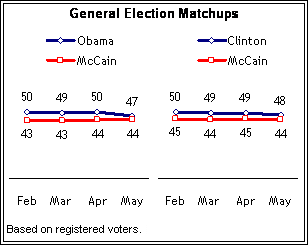
General election matchups find John McCain trailing the Democratic candidates. Obama holds a slight 47%-44% over McCain, which is narrower than his six-point advantage in both April and March. Clinton currently has a 48%-44% lead over McCain, which is largely unchanged from April and March.
Looking ahead to the fall election, a critical question is how independent voters will break, and the evidence so far is decidedly mixed. In an Obama-McCain matchup, independent voters today are evenly divided, with 44% favoring each candidate. A month ago, Obama held a sizable 52% to 41% advantage over McCain among independents. But a month before that – in March – McCain held a seven-point advantage over Obama (49% to 42%).
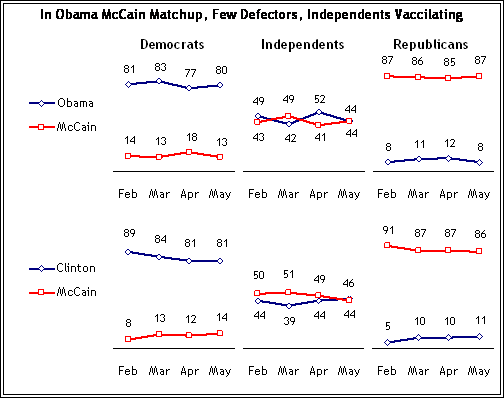
The proportion of Democrats who favor McCain in a matchup with Obama has fallen slightly since April, from 18% to 13%. This is about the same share of Democrats favoring McCain in a matchup with Clinton (14%). The number of Democrats who would defect to McCain if Obama is the nominee has fallen in some key voting groups. In April, 29% of white Democrats who have not attended college said they favored McCain over Obama; this has declined slightly to 19% today. And the proportion of white Democrats with household incomes under $50,000 who would defect to McCain has fallen from 26% to 14% over the past month.
The proportion of Democrats who say they plan to vote for McCain (13%) is slightly higher than the number of Republicans who say they plan to vote for Obama (8%). Fully 87% of Republican voters say they back McCain over Obama, while 80% of Democrats back Obama over McCain.
Affirmative Support for Obama and McCain
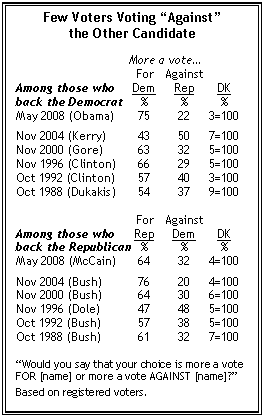
Solid majorities of both Obama and McCain supporters see their choice as a vote for their favored candidate and not as a vote against his opponent. Obama receives more positive support than any Democratic candidate in the past two decades. Fully three-quarters of voters who back Obama in a matchup against McCain view their vote as being for the Illinois senator, rather than against his Republican rival. By contrast, on the eve of the 2004 election, just 43% of John Kerry backers said they were voting for him while 50% were more motivated by their disapproval of George W. Bush.
Affirmative support for McCain mirrors the support Bush received in his first bid for the White House in 2000. Fully 64% of McCain voters say their choice is pro-McCain, the same percentage as characterized their choice as being pro-Bush eight years ago. About one-third of those who back the Arizona senator say their vote is anti-Obama (32%).
Impressions of Candidates
The long primary season has taken a toll on voters’ views of John McCain and Barack Obama. For the first time since the campaign began, about the same proportion expresses an unfavorable opinion of McCain (45%) as a favorable opinion (48%). And Obama’s image, while on balance still positive, has grown increasingly negative over the past few months; just over half (51%) view him favorably, compared with 59% in late February. Unfavorable ratings of Obama have risen from 35% to 42% over the same period. Opinions of Hillary Clinton remain as divided as they were before the first caucus and primary.
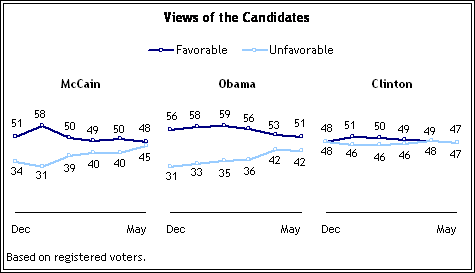
Reasons for Unfavorable Views
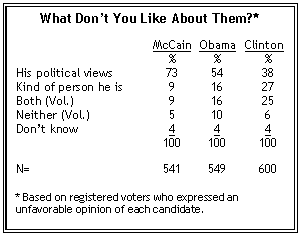
Most voters who express unfavorable views of Barack Obama and John McCain say they dislike the candidates’ political beliefs the most, but Obama is also hurt by voters’ personal criticism of him. Just over half of voters (54%) who hold negative opinions of Obama dislike the Democratic candidate’s take on issues, but a considerable minority says his personal attributes are at least partly to blame (32%).
In contrast, opposition to McCain is more uniformly guided by political disagreement – nearly three-quarters (73%) of voters who hold unfavorable views of McCain say his political beliefs are the reason they do not like him. Fewer than four-in-ten voters who dislike Hillary Clinton (38%) say it is because of her politics, while 27% say it is the kind of person she is that makes them not like her, and 25% say it is a combination of the two.
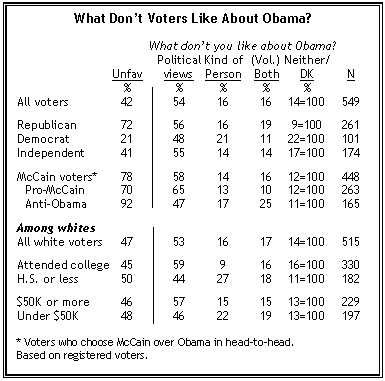
White working-class critics of Obama are the most likely to say the negative image they have of him reflects a personal dislike – more than a quarter (27%) of whites with a high school education or less who express an unfavorable opinion of Obama cite the kind of person he is; another 18% say both personal attributes and politics are a factor. By comparison, only 9% of white Obama critics who attended college cite personal reasons, while about six-in-ten (59%) say they dislike the Democratic candidate’s political views and 16% say it is both personal and political.
Impressions of Cindy McCain and Michelle Obama
At this point in the presidential campaign, nearly half of Americans (46%) say they have heard nothing at all about Cindy McCain, John McCain’s wife, according to the most recent weekly News Interest Index. Barack Obama’s wife has been far more visible – about three-quarters (76%) have heard at least a little about Michelle Obama, including about one-in-five (21%) who say they have heard a lot about her.
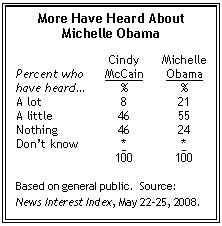
Republicans are as likely as Democrats to say they have heard a lot about Michelle Obama (24% each), while slightly fewer independents say that is the case (18%). Republicans, Democrats and independents are equally unfamiliar with Cindy McCain; just 10% of Republicans, 8% of Democrats and 6% of independents have heard a lot about her.
Voters’ opinions of Cindy McCain and Michelle Obama are favorable, on balance, but slightly more offer negative ratings of Michelle Obama than they do of Cindy McCain. About one-in-five voters (22%) have an unfavorable view of Barack Obama’s wife, while McCain’s wife is rated negatively by just 16%.
Unlike in 2004, when views of Teresa Heinz Kerry were clearly split along gender lines, with women much more likely than men to have a favorable opinion of John Kerry’s wife, there is no apparent gender gap in views of Mrs. Obama and Mrs. McCain. For example, 46% of female voters like Michelle Obama, and 42% of male voters agree.
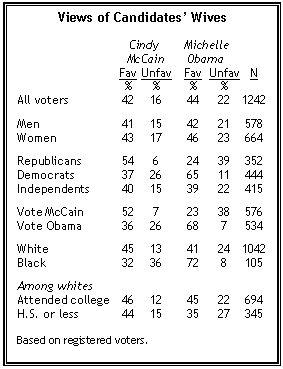
However, opinions of Michelle Obama and Cindy McCain are divided along racial lines. More black voters have an unfavorable view of Mrs. McCain (36%) than have a favorable view (32%); among white voters, 45% have a positive opinion of Cindy McCain and just 13% have a negative view. More than seven-in-ten black voters (72%) have a favorable opinion of Michelle Obama, but just 41% of whites do. And Mrs. Obama’s favorable ratings are somewhat lower among white voters with a high school education or less; 35% in that group have a positive opinion, compared with 45% of white voters who have attended college.


